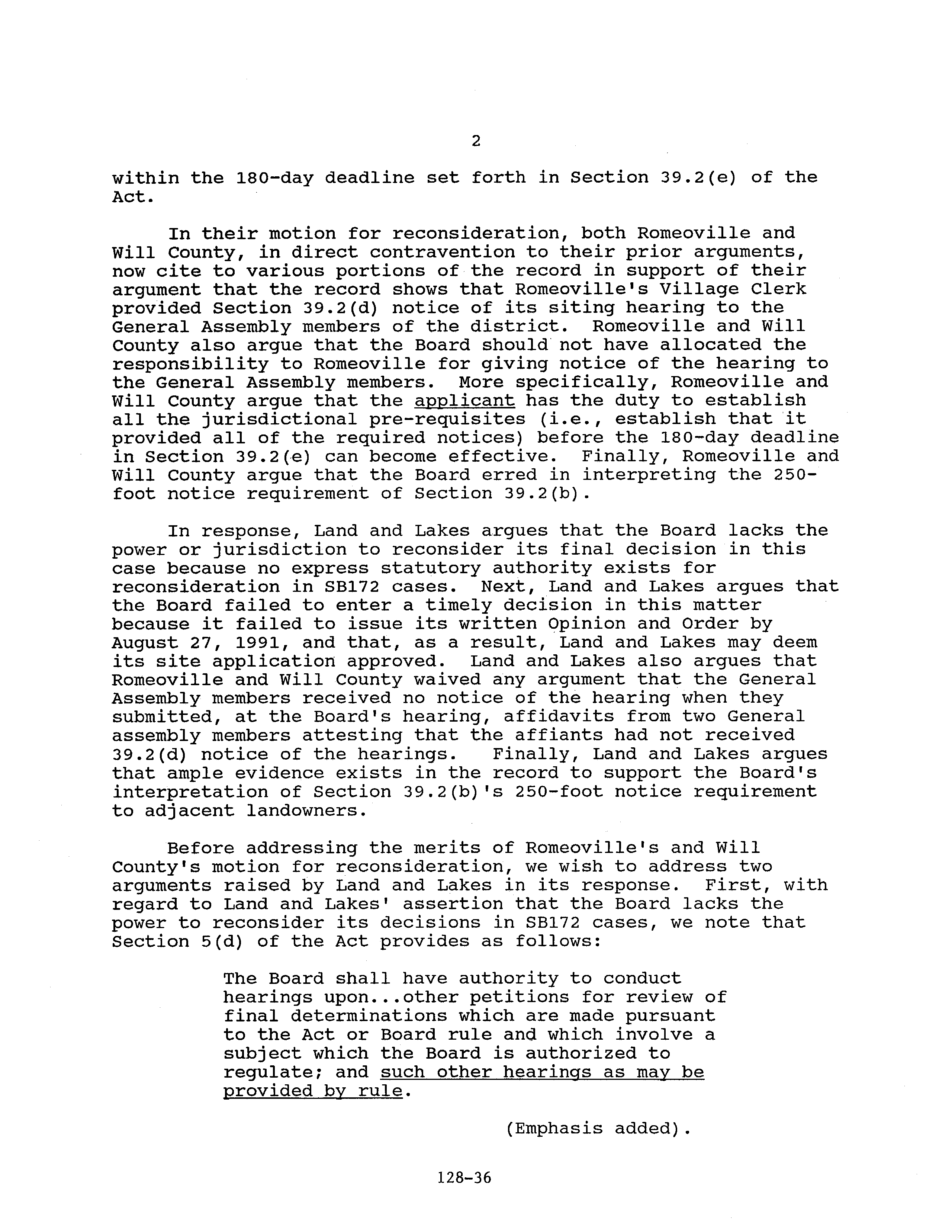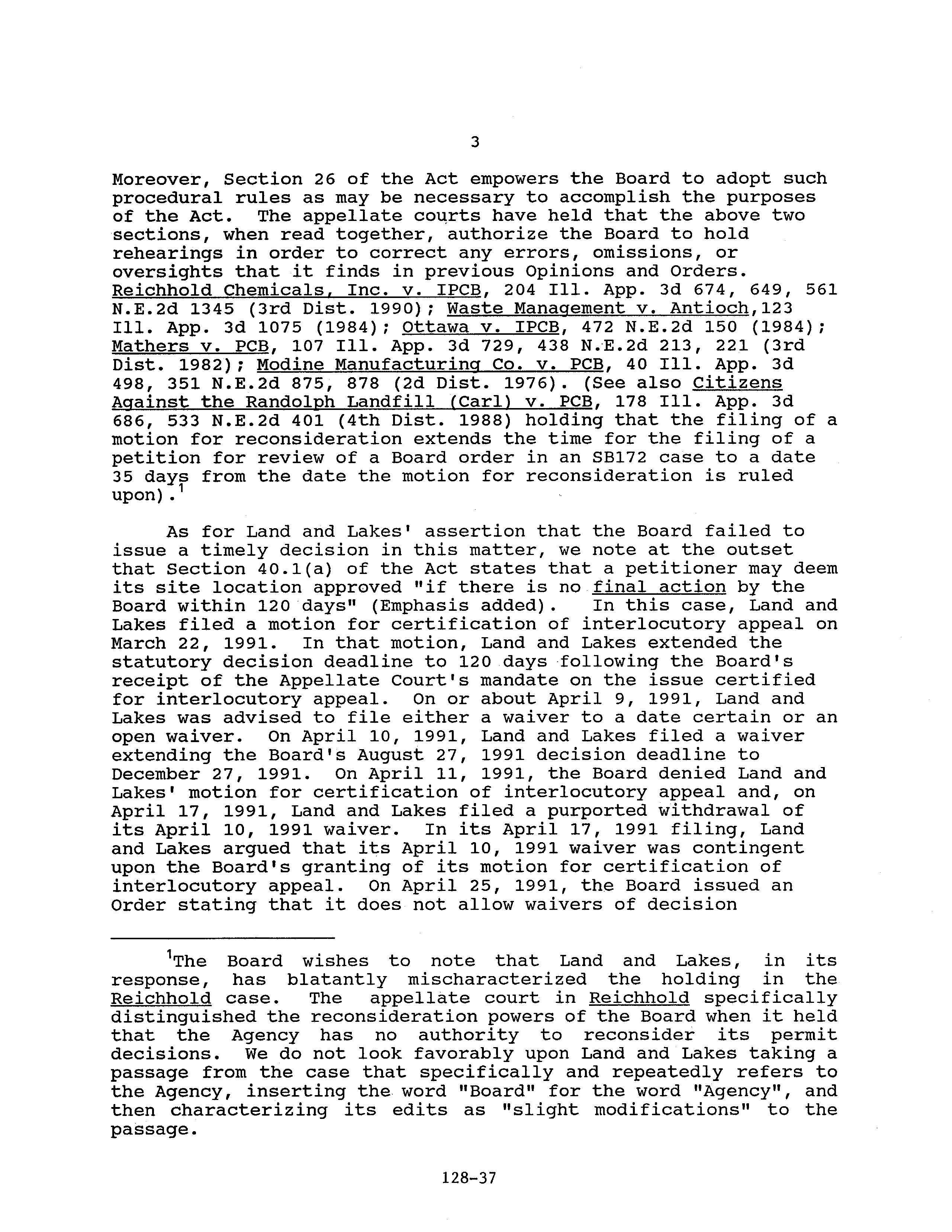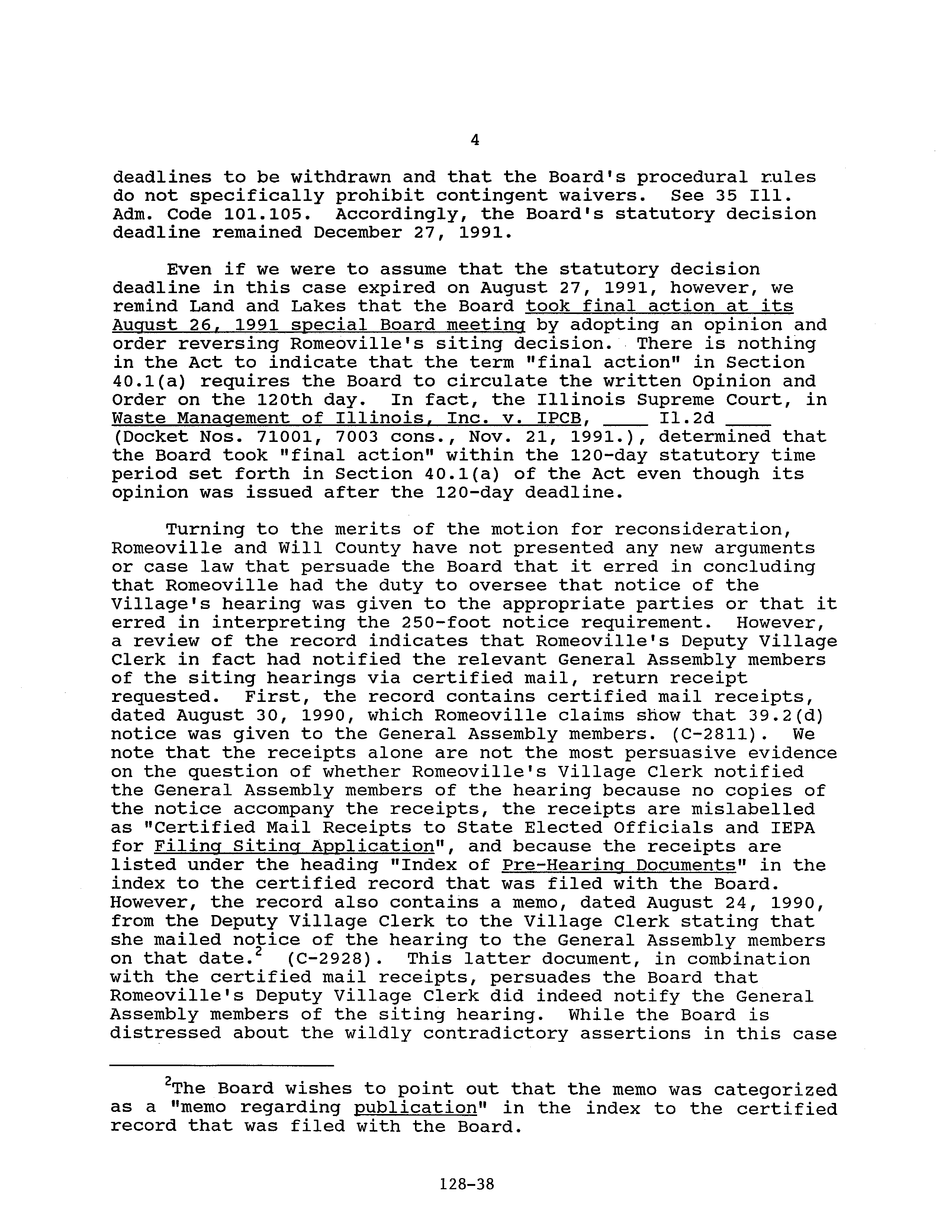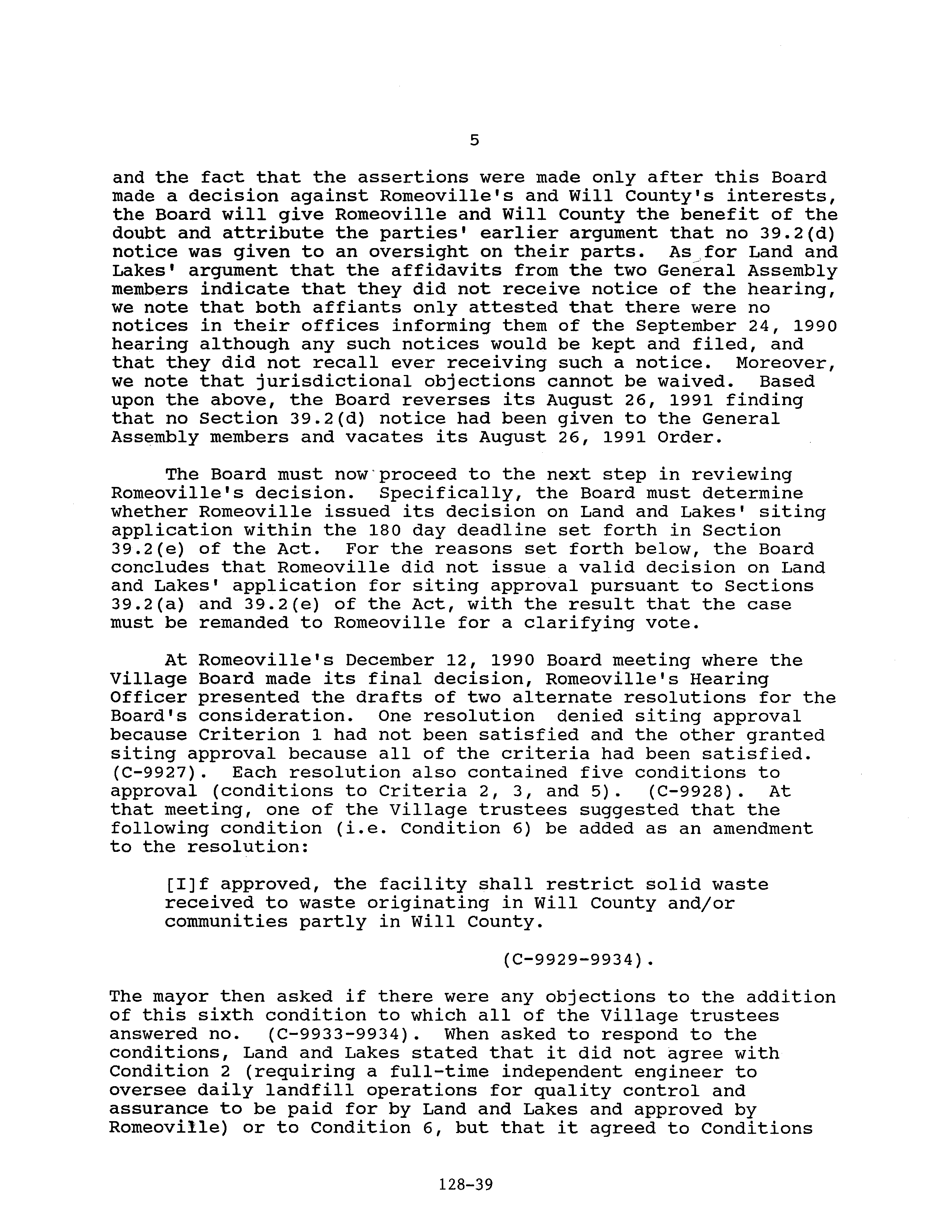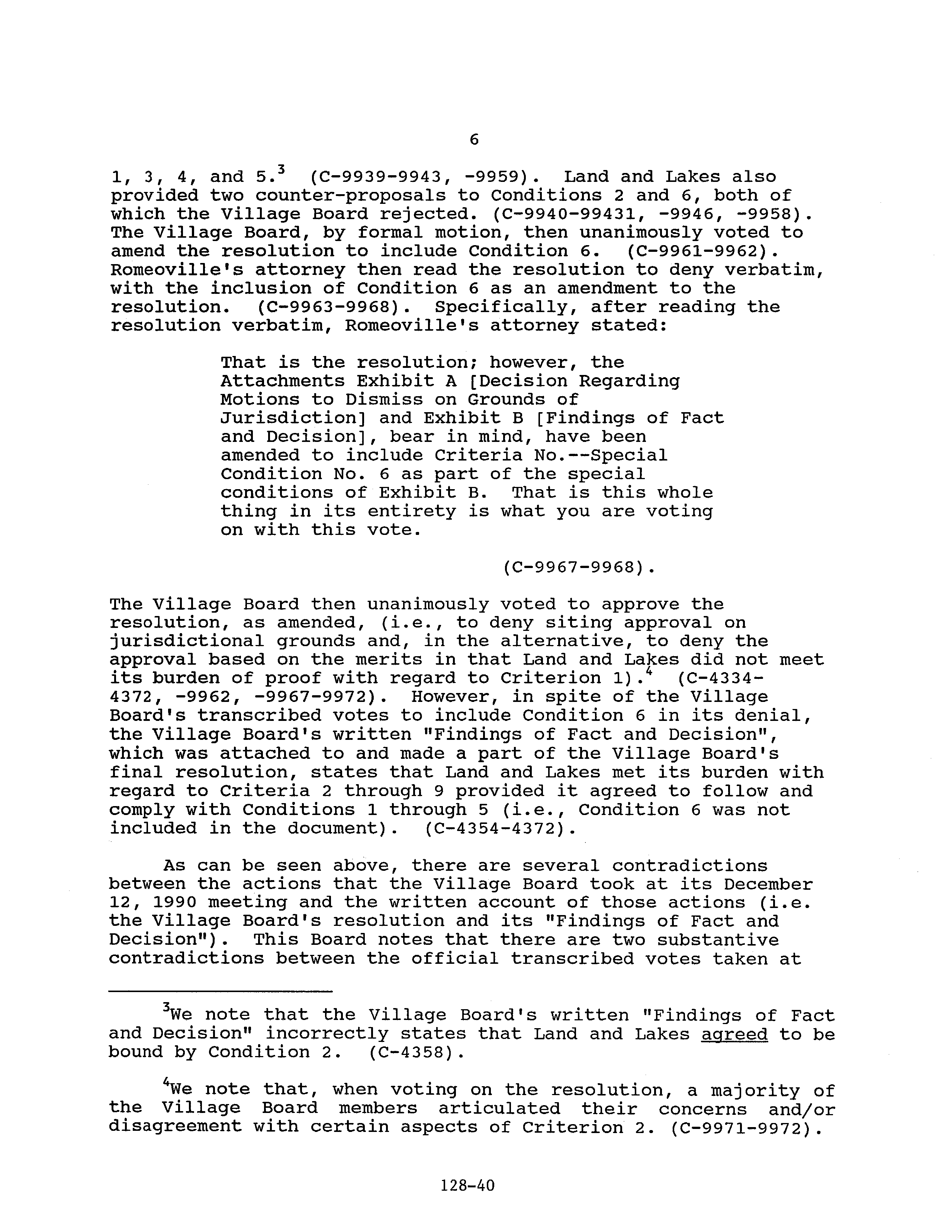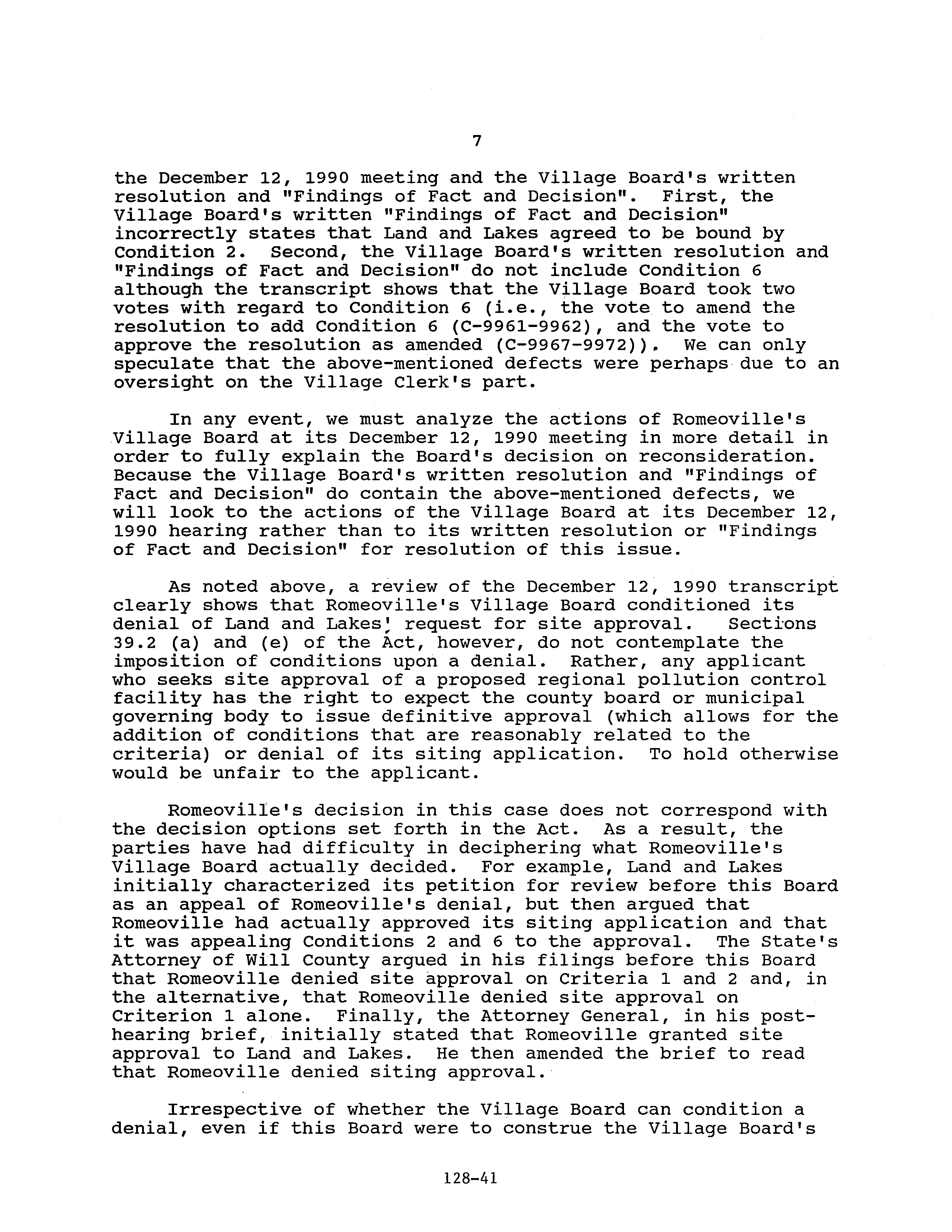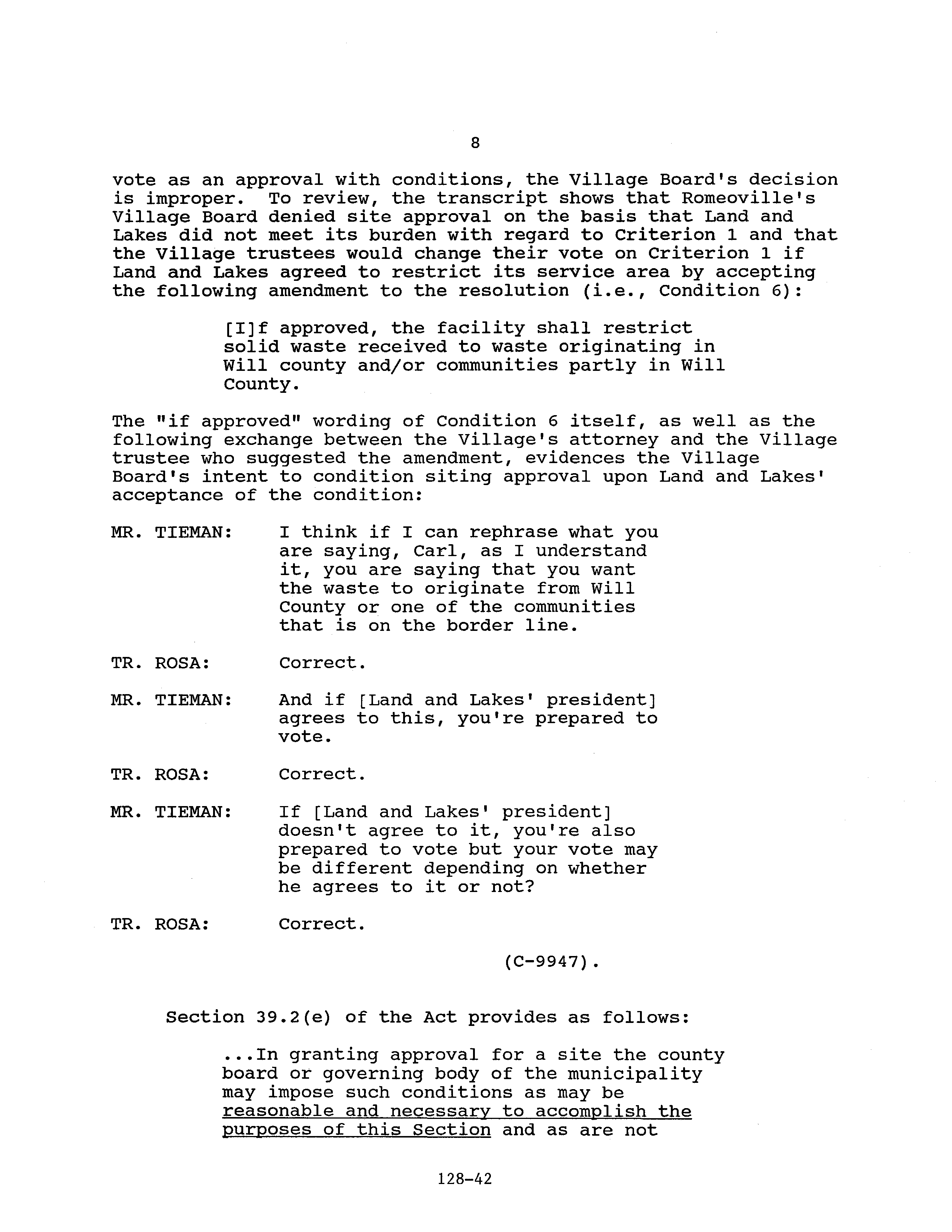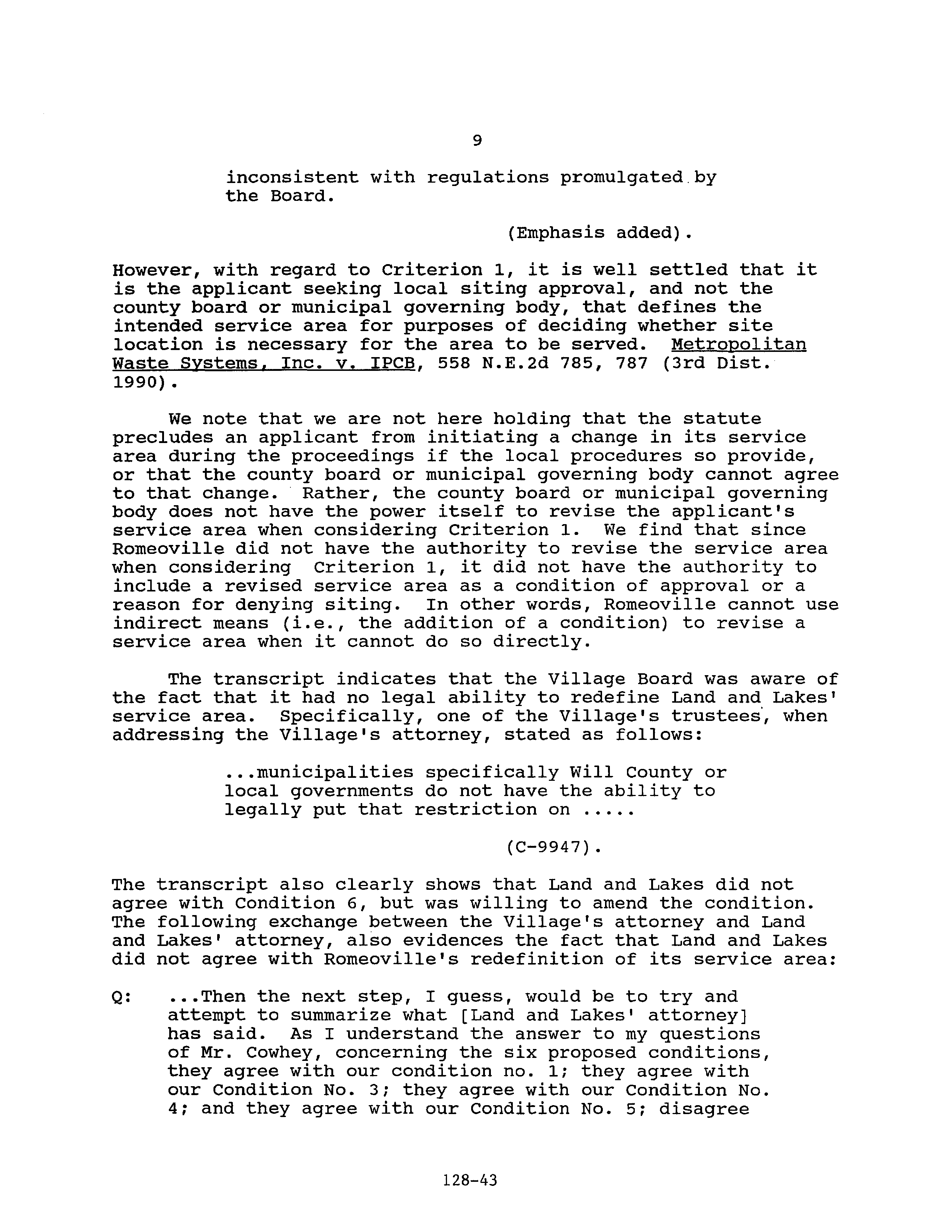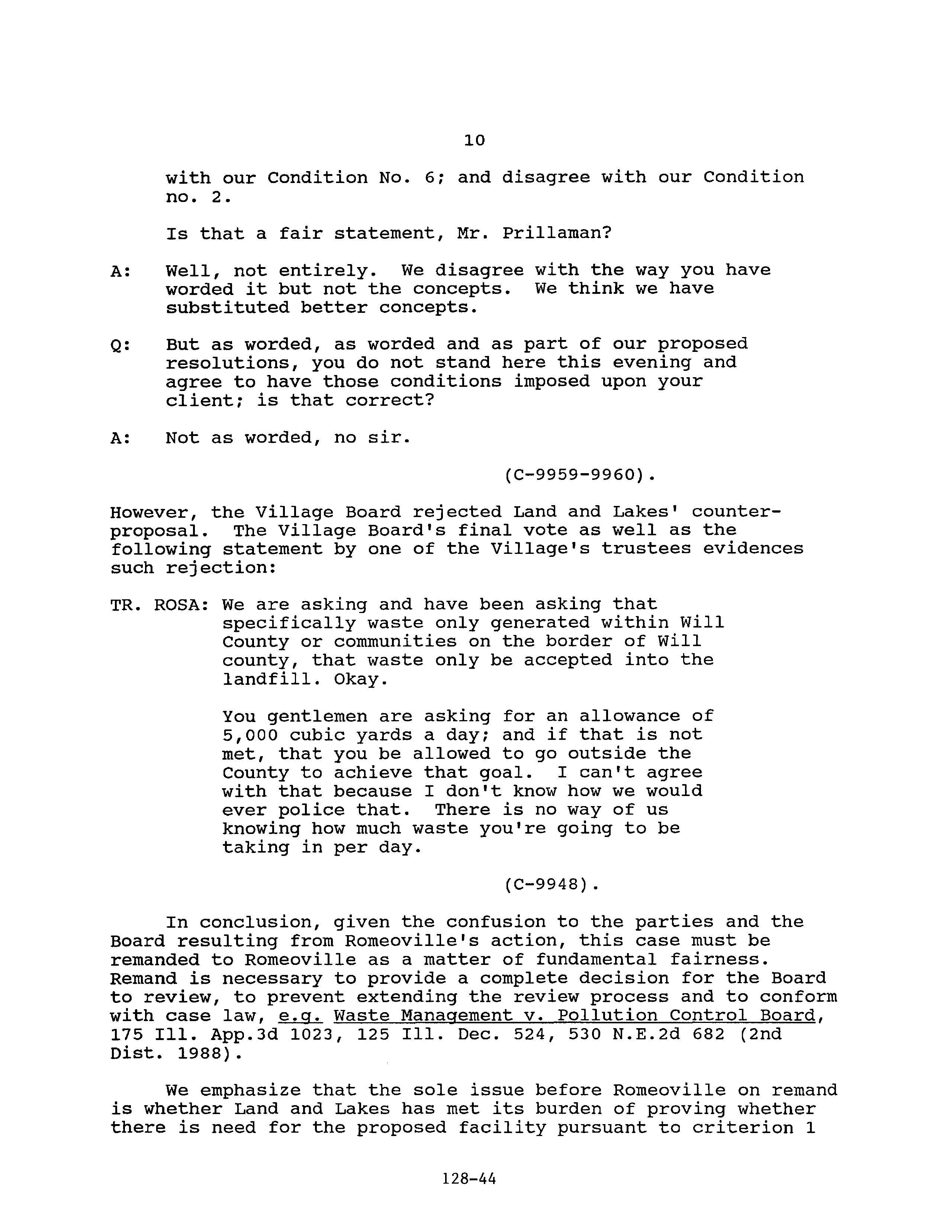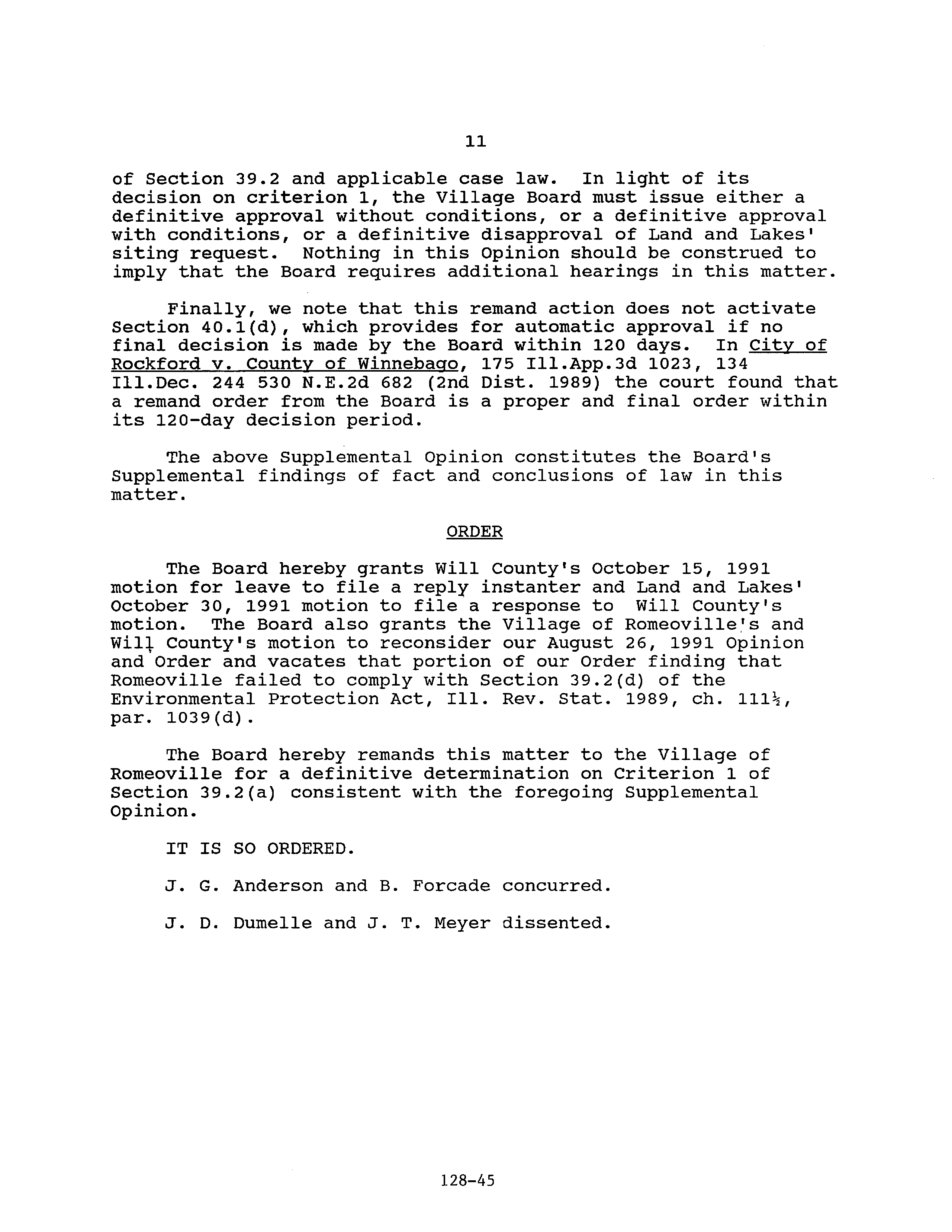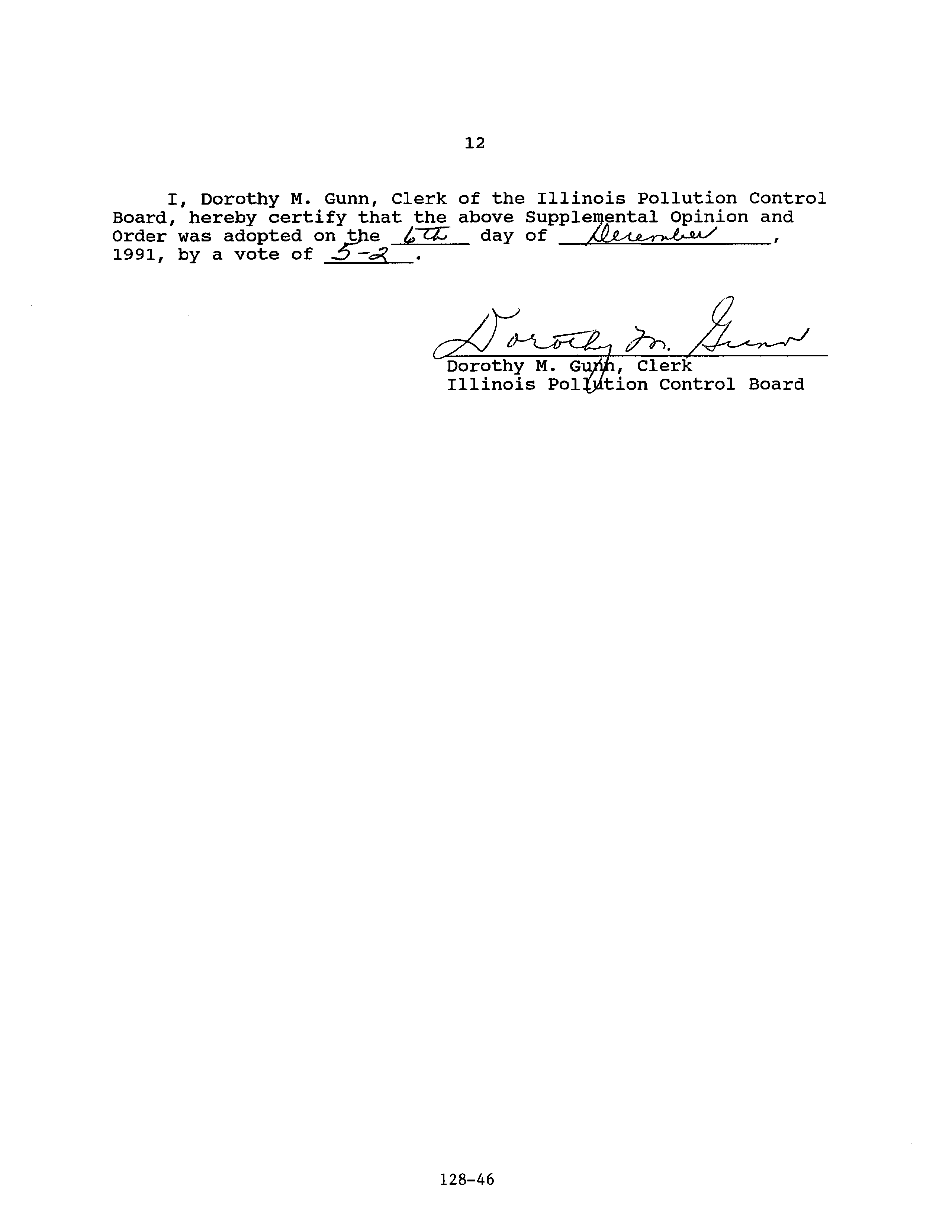ILLINOIS POLLUTION CONTROL BOARD
December
6,
199.
LAND AND LAKES COMPANY, JMC
)
OPERATIONS,
INC., and NBD
)
TRUST COMPANY OF ILLINOIS
AS TRUSTEE UNDER TRUST NO.
2624EG,
Petitioners,
PCB 91—7
v.
)
(Landfill Siting)
VILLAGE OF ROMEOVILLE,
Respondent,
)
COUNTY OF WILL,
and
PEOPLE OF THE STATE OF
ILLINOIS,
Intervenors.
SUPPLEMENTAL OPINION AND ORDER OF THE BOARD
(by R.
C. Flemal):
On September 27,
1991,
the Village of Romeoville
(liRomeovilleti)
and the County of Will
(“Will County”) filed a
motion to reconsider the Board’s August
26, 1991 Opinion and
Order in this matter.
On October 15, 1991,
Land and Lakes
Company,
JMC
Operations,
Inc. and NBD Trust Company of Illinois,
as Trustee under Trust No. 2624EG (“Land and Lakes”),
filed its
response to the motion to reconsider.
On October 23,
1991,
Romeoville and Will County filed a reply to Land and Lakes’
response as well as a motion for leave to file the reply
instanter.
On October 30,
1991,
Land and Lakes filed a response
to Will County’s motion for leave to file a reply.
The Board
hereby grants the motion for leave to file a reply instanter.
Because the Board grants Will County’s motion for leave to file a
reply,
it will also allow Land and Lakes’ October 30, 1991
response although it did not file a motion for leave to file such
response.
Finally, the Board grants the motion for
reconsideration.
The Board,
in its August 26, 1991 Opinion and Order, held
that Romeoville’s failure to provide Section 39.2(d)
notice
(see
Section 39.2(d)
of the Environmental Protection Act
(“Act”),
Ill.
Rev.
Stat.
1989,
ch.
111½,
1039.2(d))
of its local siting hearing
to the General Assembly members rendered its December 12,
1990
siting decision void on jurisdictional grounds.
The Board then
concluded that,
as a result of such failure, siting approval of
Land and Lakes’ proposed landfill expansion on Parcel A was
deemed issued because Romeoville’s siting decision was not issued
128—35
2
within the 180—day deadline set forth in Section 39.2(e)
of the
Act.
In their motion for reconsideration, both Romeoville and
Will County,
in direct contravention to their prior arguments,
now cite to various portions of the record in support of their
argument that the record shows that Romeoville’s Village Clerk
provided Section 39.2(d)
notice of its siting hearing to the
General Assembly members of the district.
Romeoville and Will
County also argue that the Board should not have allocated the
responsibility to Romeoville for giving notice of the hearing to
the General Assembly members.
More specifically, Romeoville and
Will County argue that the applicant has the duty to establish
all the jurisdictional pre-requisites (i.e.,
establish that it
provided all of the required notices) before the 180-day deadline
in Section 39.2(e)
can become effective.
Finally, Romeoville and
Will County argue that the Board erred in interpreting the 250-
foot notice requirement of Section 39.2(b).
In response, Land and Lakes argues that the Board lacks the
power or jurisdiction to reconsider its final decision in this
case because no express statutory authority exists for
reconsideration in SB172 cases.
Next,
Land and Lakes argues that
the Board failed to enter a timely decision in this matter
because it failed to issue its written Opinion and Order by
August 27,
1991, and that,
as a result, Land and Lakes may deem
its site application approved.
Land and Lakes also argues that
Roineoville and Will County waived any argument that the General
Assembly members received no notice of the hearing when they
submitted,
at the Board’s hearing, affidavits from two General
assembly members attesting that the affiants had not received
39.2(d)
notice of the hearings.
Finally, Land and Lakes argues
that ample evidence exists in the record to support the Board’s
interpretation of Section 39.2(b) ‘s 250-foot notice requirement
to adjacent landowners.
Before addressing the merits of Roineoville’s and Will
County’s motion for reconsideration, we wish to address two
arguments raised by Land and Lakes in its response.
First,
with
regard to Land and Lakes’ assertion that the Board lacks the
power to reconsider its decisions in SB172 cases, we note that
Section 5(d)
of the Act provides as follows:
The Board shall have authority to conduct
hearings upon.
.
.
other petitions for review of
final determinations which are made pursuant
to the Act or Board rule and which involve a
subject which the Board is authorized to
regulate; and such other hearings as may be
provided by rule.
(Emphasis added).
128—36
3
Moreover, Section 26 of the Act empowers the Board to adopt such
procedural rules as may be necessary to accomplish the purposes
of the Act.
The appellate courts have held that the above two
sections, when read together, authorize the Board to hold
rehearings in order to correct any errors,
omissions, or
oversights that it finds
in previous Opinions and Orders.
Reichhold Chemicals,
Inc. v.
IPCB, 204 Ill.
App. 3d 674,
649,
561
N.E.2d 1345
(3rd Dist.
1990); Waste Management v. Antioch,l23
Ill. App.
3d 1075
(1984); Ottawa v.
IPCB,
472 N.E.2d 150
(1984);
Mathers v.
PCB,
107 Ill. App.
3d 729,
438 N.E.2d 213,
221
(3rd
Dist.
1982); Modine Manufacturing Co.
v.
PCB,
40 Ill. App.
3d
498, 351 N.E.2d 875, 878
(2d Dist.
1976).
(See also Citizens
Against the Randolph Landfill
(Carl)
v.
PCB,
178 Ill. App.
3d
686,
533 N.E.2d 401 (4th Dist.
1988) holding that the filing of a
motion for reconsideration extends the time for the filing of a
petition for review of a Board order in an SB172 case to a date
35 days from the date the motion for reconsideration is ruled
upon)
.~
As for Land and Lakes’ assertion that the Board failed to
issue a timely decision in this matter, we note at the outset
that Section 40.1(a)
of the Act states that a petitioner may deem
its site location approved “if there is nofinal action by the
Board within 120 days”
(Emphasis added).
In this case,
Land and
Lakes filed a motion for certification of interlocutory appeal on
March 22,
1991.
In that motion, Land and Lakes extended the
statutory decision deadline to 120 days following the Board’s
receipt of the Appellate Court’s mandate on the issue certified
for interlocutory appeal.
On or about April
9,
1991,
Land and
Lakes was advised to file either a waiver to a date certain or an
open waiver.
On April 10, 1991,
Land and Lakes filed a waiver
extending the Board’s August 27,
1991 decision deadline to
December 27,
1991.
On April 11,
1991,
the Board denied Land and
Lakes’ motion for certification of interlocutory appeal and, on
April
17,
1991, Land and Lakes filed a purported withdrawal of
its April
10,
1991 waiver.
In its April 17,
1991 filing, Land
and Lakes argued that its April
10,
1991 waiver was contingent
upon the Board’s granting of its motion for certification of
interlocutory appeal.
On April 25,
1991, the Board issued an
Order stating that it does not allow waivers of decision
1The
Board
wishes
to
note
that
Land
and
Lakes,
in
its
response,
has
blatantly
mischaracterized
the
holding
in
the
Reichhold case.
The
appellate
court
in Reichhold specifically
distinguished the reconsideration powers of the Board when it held
that
the
Agency
has
no
authority
to
reconsider
its
permit
decisions.
We do not look favorably upon Land and Lakes taking a
passage from the case that specifically and repeatedly refers to
the Agency, inserting the word “Board” for the word “Agency”,
and
then characterizing its
edits
as
“slight modifications”
to
the
passage.
128—37
4
deadlines to be withdrawn and that the Board’s procedural rules
do not specifically prohibit contingent waivers.
See 35 Ill.
Adm. Code 101.105.
Accordingly, the Board’s statutory decision
deadline remained December 27,
1991.
Even if we were to assume that the statutory decision
deadline in this case expired on August 27,
1991,
however, we
remind Land and Lakes that the Board took final action at its
August 26,
1991 special Board meeting by adopting an opinion and
order reversing Romeoville’s siting decision.
There is nothing
in the Act to indicate that the term “final action” in Section
40.1(a) requires the Board to circulate the written Opinion and
Order on the 120th day.
In fact, the Illinois Supreme Court,
in
Waste Management of Illinois,
Inc.
v.
IPCB,
____
Il.2d
____
(Docket Nos.
71001,
7003 cons.,
Nov.
21,
1991.), determined that
the Board took “final action” within the 120-day statutory time
period set forth in Section 40.1(a)
of the Act even though its
opinion was issued after the 120-day deadline.
Turning to the merits of the motion for reconsideration,
Roineoville and Will County have not presented any new arguments
or case law that persuade the Board that it erred in concluding
that Romeoville had the duty to oversee that notice of the
Village’s hearing was given to the appropriate parties or that it
erred in interpreting the 250-foot notice requirement.
However,
a review of the record indicates that Romeoville’s Deputy Village
Clerk in fact had notified the relevant General Assembly members
of the siting hearings via certified mail,
return receipt
requested.
First, the record contains certified mail receipts,
dated August 30,
1990, which Roineoville claims show that 39.2(d)
notice was given to the General Assembly members.
(C-28ll).
We
note that the receipts alone are not the most persuasive evidence
on the question of whether Romeoville’s Village Clerk notified
the General Assembly members of the hearing because no copies of
the notice accompany the receipts, the receipts are mislabelled
as “Certified Mail Receipts to State Elected Officials and IEPA
for Filing Siting Application”, and because the receipts are
listed under the heading “Index of Pre-Hearing Documents”
in the
index to the certified record that was filed with the Board.
However, the record also contains a memo,
dated August 24,
1990,
from the Deputy Village Clerk to the Village Clerk stating that
she mailed no~iceof the hearing to the General Assembly members
on that date.
(C-2928).
This latter document,
in combination
with the certified mail receipts, persuades the Board that
Roiueoville’s Deputy Village Clerk did indeed notify the General
Assembly members of the siting hearing.
While the Board is
distressed about the wildly contradictory assertions in this case
2The Board wishes to point out that the memo was categorized
as
a “memo regarding publication”
in the
index
to the certified
record that was filed with the Board.
128—38
5
and the fact that the assertions were made only after this Board
made a decision against Roineoville’s and Will County’s interests,
the Board will give Roiueoville and Will County the benefit of the
doubt and attribute the parties’ earlier argument that no 39.2(d)
notice was given to an oversight on their parts.
As~for Land and
Lakes’ argument that the affidavits from the two General Assembly
members indicate that they did not receive notice of the hearing,
we note that both affiants only attested that there were no
notices in their offices informing them of the September 24,
1990
hearing although any such notices would be kept and filed, and
that they did not recall ever receiving such a notice.
Moreover,
we note that jurisdictional objections cannot be waived.
Based
upon the above,
the Board reverses its August 26,
1991 finding
that no Section 39.2(d)
notice had been given to the General
Assembly members and vacates its August 26,
1991 Order.
The Board must now’proceed to the next step in reviewing
Romeoville’s decision.
Specifically, the Board must determine
whether Romeoville issued its decision on Land and Lakes’
siting
application within the 180 day deadline set forth in Section
39.2(e)
of the Act.
For the reasons set forth below, the Board
concludes that Romeoville did not issue
a valid decision on Land
and Lakes’ application for siting approval pursuant to Sections
39.2(a)
and 39.2(e)
of the Act, with the result that the case
must be remanded to Romeoville for a clarifying vote.
At Romeoville’s December 12,
1990 Board meeting where the
Village Board made its final decision, Romeoville’s Hearing
Officer presented the drafts of two alternate resolutions for the
Board’s consideration.
One resolution
denied siting approval
because Criterion 1 had not been satisfied and the other granted
siting approval because all of the criteria had been satisfied.
(C-9927).
Each resolution also contained five conditions to
approval
(conditions to Criteria
2,
3,
and 5).
(C-9928).
At
that meeting, one of the Village trustees suggested that the
following condition (i.e.
Condition 6)
be added as an amendment
to the resolution:
If
approved, the facility shall restrict solid waste
received to waste originating in Will County and/or
communities partly in Will County.
(C—9929—9934)
The mayor then asked if there were any objections to the addition
of this sixth condition to which all of the Village trustees
answered no.
(C-9933-9934).
When asked to respond to the
conditions, Land and Lakes stated that it did not agree with
Condition
2
(requiring a full-time independent engineer to
oversee daily landfill operations for quality control and
assurance to be paid for by Land and Lakes and approved by
Romeoville)
or to Condition 6, but that it agreed to Conditions
128—39
6
1,
3,
4, and 5•3
(C—9939—9943,
—9959).
Land and Lakes also
provided two counter-proposals to Conditions
2 and 6, both of
which the Village Board rejected.
(C-9940—9943l, -9946,
-9958).
The Village Board, by formal motion, then unanimously voted to
amend the resolution to include Condition 6.
(C-9961-9962).
Romeoville’s attorney then read the resolution to deny verbatim,
with the inclusion of Condition 6 as an amendment to the
resolution.
(C—9963-9968).
Specifically, after reading the
resolution verbatim, Romeoville’s attorney stated:
That is the resolution; however, the
Attachments Exhibit A Decision
Regarding
Motions to Dismiss on Grounds of
Jurisdiction
and Exhibit B Findings
of Fact
and Decision,
bear in mind,
have been
amended to include Criteria No.—-Special
Condition No.
6 as part of the special
conditions of Exhibit B.
That is this whole
thing in its entirety is what you are voting
on with this vote.
(C—9967—9968)
The Village Board then unanimously voted to approve the
resolution,
as amended,
(i.e., to deny siting approval on
jurisdictional grounds and,
in the alternative, to deny the
approval based on the merits
in that Land and Lakes did not meet
its burden of proof with regard to Criterion 1)
.‘~
(C-4334-
4372,
—9962,
—9967—9972).
However,
in spite of the Village
Board’s transcribed votes to include Condition 6 in its denial,
the Village Board’s written “Findings of Fact and Decision”,
which was attached to and made a part of the Village Board’s
final resolution,
states that Land and Lakes met its burden with
regard to Criteria
2 through 9 provided it agreed to follow and
comply with Conditions
1 through 5
(i.e., Condition
6 was not
included in the document).
(C-4354-4372).
As can be seen above,
there are several contradictions
between the actions that the Village Board took at its December
12, 1990 meeting and the written account of those actions
(i.e.
the Village Board’s resolution and its “Findings of Fact and
Decision”).
This Board notes that there are two substantive
contradictions between the official transcribed votes taken at
3we note that the Village Board’s written
“Findings of Fact
and Decision” incorrectly states that Land and Lakes agreed to be
bound by Condition 2.
(C-4358).
4We note that, when voting on the resolution,
a majority of
the
Village
Board
members
articulated
their
concerns
and/or
disagreement with certain aspects of Criterion 2.
(C-9971-9972).
128—40
7
the December 12,
1990 meeting and the Village Board’s written
resolution and “Findings of Fact and Decision”.
First,
the
Village Board’s written “Findings of Fact and Decision”
incorrectly states that Land and Lakes agreed to be bound by
Condition 2.
Second, the Village Board’s written resolution and
“Findings of Fact and Decision” do not include Condition 6
although the transcript shows that the Village Board took two
votes with regard to Condition
6
(i.e., the vote to amend the
resolution to add Condition 6
(C-996l-9962), and the vote to
approve the resolution as amended (C-9967—9972)).
We can only
speculate that the above—mentioned defects were perhaps due to an
oversight on the Village Clerk’s part.
In any event, we must analyze the actions of Romeoville’s
Village Board at its December 12, 1990 meeting in more detail in
order to fully explain the Board’s decision on reconsideration.
Because the Village Board’s written resolution and “Findings of
Fact and Decision” do contain the above—mentioned defects, we
will look to the actions of the Village Board at its December 12,
1990 hearing rather than to its written resolution or “Findings
of Fact and Decision” for resolution of this issue.
As noted above,
a review of the December 12,
1990 transcript
clearly shows that Romeoville’s Village Board conditioned its
denial of Land and Lakes~request for site approval.
Sections
39.2
(a)
and
(e)
of the Act, however, do not contemplate the
imposition of conditions upon a denial.
Rather, any applicant
who seeks site approval of a proposed regional pollution control
facility has the right to expect the county board or municipal
governing body to issue definitive approval
(which allows for the
addition of conditions that are reasonably related to the
criteria) or denial of its siting application.
To hold otherwise
would be unfair to the applicant.
Romeoville’s
decision in this case does not correspond with
the decision options set forth in the Act.
As a result, the
parties have had difficulty in deciphering what Romeoville’s
Village Board actually decided.
For example, Land and Lakes
initially characterized its petition for review before this Board
as an appeal of Romeoville’s denial, but then argued that
Romeoville had actually approved its siting application and that
it was appealing Conditions
2 and 6 to the approval.
The State’s
Attorney of Will County argued in his filings before this Board
that Romeoville denied site approval on Criteria
1 and 2 and,
in
the alternative, that Romeoville denied site approval on
Criterion 1 alone.
Finally, the Attorney General,
in his post-
hearing brief,
initially stated that Romeoville granted site
approval to Land and Lakes.
He then amended the brief to read
that Romeoville denied siting approval.
Irrespective of whether the Village Board can condition
a
denial, even if this Board were to construe the Village Board’s
128—41
8
vote as an approval with conditions, the Village Board’s decision
is improper.
To review, the transcript shows that Romeoville’s
Village Board denied site approval on the basis that Land and
Lakes did not meet its burden with regard to Criterion
1 and that
the Village trustees would change their vote on Criterion 1 if
Land and Lakes agreed to restrict its service area by accepting
the following amendment to the resolution
(i.e., Condition 6):
If
approved, the facility shall restrict
solid waste received to waste originating in
Will county and/or communities partly in Will
County.
The “if approved” wording of Condition
6 itself, as well as the
following exchange between the Village’s attorney and the Village
trustee who suggested the amendment, evidences the Village
Board’s intent to condition siting approval upon Land and Lakes’
acceptance of the condition:
MR. TIEMAN:
TR. ROSA:
MR.
TIEMAN:
I think if I can rephrase what you
are saying, Carl, as
I understand
it, you are saying that you want
the waste to originate from Will
County or one of the communities
that
is on the border line.
Correct.
And if Land
and Lakes’
president
agrees to this, you’re prepared to
vote.
TR. ROSA:
Correct
MR.
TIEMAN:
TR. ROSA:
If
Land
and Lakes’
president
doesn’t agree to
it, you’re also
prepared to vote but your vote may
be different depending on whether
he agrees to it or not?
Correct.
(C—9947)
Section 39.2(e) of the Act provides as follows:
...In granting approval for a site the county
board or governing body of the municipality
may impose such conditions as may be
reasonable and necessary to accomplish the
purposes of this Section and as are not
128—42
9
inconsistent with regulations promulgated.by
the Board.
(Emphasis added).
However, with regard to Criterion 1,
it is well settled that it
is the applicant seeking local siting approval, and not the
county board or municipal governing body, that defines the
intended service area for purposes of deciding whether site
location is necessary for the area to be served.
Metropolitan
Waste Systems,
Inc.
v. IPCB,
558 N.E.2d 785,
787
(3rd Dist.
1990).
We note that we are not here holding that the statute
precludes an applicant from initiating a change in its service
area during the proceedings if the local procedures so provide,
or that the county board or municipal governing body cannot agree
to that change.
Rather, the county board or municipal governing
body does not have the power itself to revise the applicant’s
service area when considering Criterion 1.
We find that since
Romeoville did not have the authority to revise the service area
when considering
Criterion 1,
it did not have the authority to
include a revised service area as a condition of approval or a
reason for denying siting.
In other words,
Romeoville cannot use
indirect means
(i.e., the addition of a condition)
to revise a
service area when it cannot do so directly.
The transcript indicates that the Village Board was aware of
the fact that it had no legal ability to redefine Land and Lakes’
service area.
Specifically, one of the Village’s trustees, when
addressing the Village’s attorney, stated as follows:
municipalities specifically Will County or
local governments do not have the ability to
legally put that restriction on
(C—9947)
The transcript also clearly shows that Land and Lakes did not
agree with Condition 6, but was willing to amend the condition.
The following exchange between the Village’s attorney and Land
and Lakes’ attorney, also evidences the fact that Land and Lakes
did not agree with Romeoville’s redefinition of its service area:
Q:
..
.Then the next step,
I guess, would be to try and
attempt to summarize what Land
and Lakes’
attorney
has said.
As
I understand the answer to my questions
of Mr. Cowhey, concerning the six proposed conditions,
they agree with our condition no.
1; they agree with
our Condition No.
3; they agree with our Condition No.
4; and they agree with our Condition No.
5; disagree
128—43
10
with our Condition No.
6; and disagree with our Condition
no.
2.
Is that a fair statement,
Mr.
Prillainan?
A:
Well, not entirely.
We disagree with the way you have
worded it but not the concepts.
We think we have
substituted better concepts.
Q:
But as worded, as worded and as part of our proposed
resolutions, you do not stand here this evening and
agree to have those conditions imposed upon your
client;
is that correct?
A:
Not as worded, no sir.
(C—9959—9960)
However, the Village Board rejected Land and Lakes’ counter-
proposal.
The Village Board’s final vote as well as the
following statement by one of the Village’s trustees evidences
such rejection:
TR. ROSA: We are asking and have been asking that
specifically waste only generated within Will
County or communities on the border of Will
county, that waste only be accepted into the
landfill.
Okay.
You gentlemen are asking for an allowance of
5,000 cubic yards a day; and if that is not
met, that you be allowed to go outside the
County to achieve that goal.
I can’t agree
with that because I don’t know how we would
ever police that.
There is no way of us
knowing how much waste you’re going to be
taking in per day.
(C—9948)
In conclusion,
given the confusion to the parties and the
Board resulting from Romeoville’s action, this case must be
remanded to Romeoville as
a matter of fundamental fairness.
Remand is necessary to provide a complete decision for the Board
to review, to prevent extending the review process and to conform
with case law,
e.g. Waste Management v. Pollution Control Board,
175 Ill. App.3d 1023,
125 Ill.
Dec.
524, 530 N.E.2d 682
(2nd
Dist.
1988).
We emphasize that the sole issue before Romeoville on remand
is whether Land and Lakes has met its burden of proving whether
there
is need for the proposed facility pursuant to criterion
1
128—44
11
of Section 39.2 and applicable case law.
In light of its
decision on criterion
1,
the Village Board must issue either a
definitive approval without conditions, or a definitive approval
with conditions,
or a definitive disapproval of Land and Lakes’
siting request.
Nothing in this Opinion should be construed to
imply that the Board requires additional hearings in this matter.
Finally, we note that this remand action does not activate
Section 40.1(d), which provides for automatic approval if no
final decision is made by the Board within 120 days.
In City of
Rockford v. County of Winnebago,
175 Ill.App.3d 1023,
134
I1l.Dec.
244 530 N.E.2d 682
(2nd Dist.
1989)
the court found that
a remand order from the Board is a proper and final order within
its 120—day decision period.
The above Supplemental Opinion constitutes the Board’s
Supplemental findings of fact and conclusions of law in this
matter.
ORDER
The Board hereby grants Will County’s October 15,
1991
motion for leave to file a reply instanter and Land and Lakes’
October 30,
1991 motion to file a response to
Will County’s
motion.
The Board also grants the Village of Romeoville’s and
Wil~County’s motion to reconsider our August 26, 1991 Opinion
and Order and vacates that portion of our Order finding that
Romeoville failed to comply with Section 39.2(d)
of the
Environmental Protection Act,
Ill. Rev.
Stat.
1989,
ch.
111½,
par.
1039(d).
The Board hereby remands this matter to the Village of
Romeoville for a definitive determination on Criterion
1 of
Section 39.2(a)
consistent with the foregoing Supplemental
Opinion.
IT IS SO ORDERED.
J.
G. Anderson and
B.
Forcade concurred.
J.
D. Dumelle and J.
T. Meyer dissented.
128—45
12
I, Dorothy M. Gunn, Clerk of the Illinois Pollution Control
Board, hereby certify that the above Supp1e~
alOpinion and
Order was adopted on the
hZZ
day of
___________________
1991,
by a vote of
3~—~
.
~—
C1er~
Illinois Pol~ion Control Board
128—46


